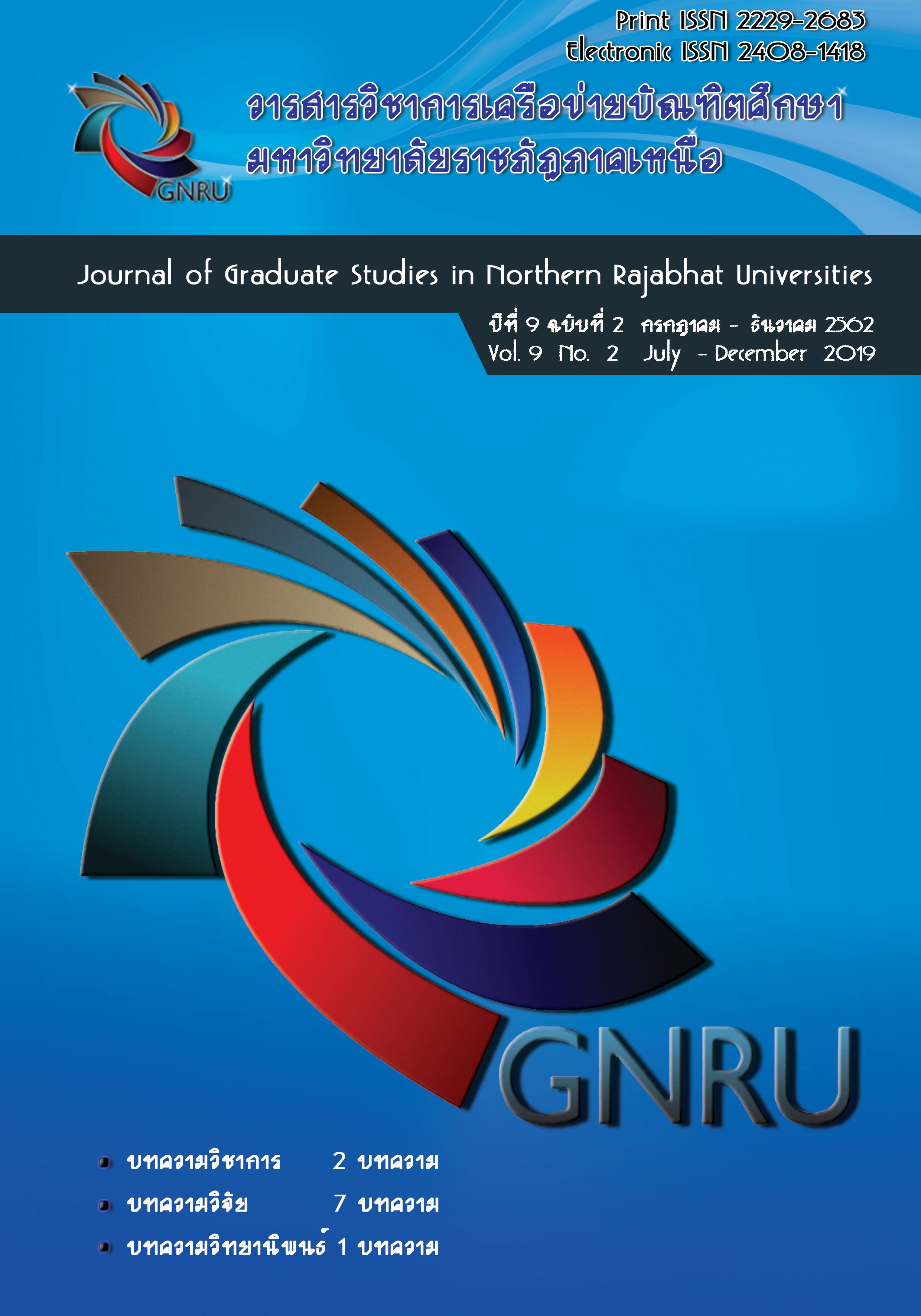การพัฒนากิจกรรมการเรียนรู้ตามแนวคิดการเรียนรู้เชิงรุกที่ส่งเสริมทักษะการคิดวิเคราะห์และความสามารถในการแสวงหาความรู้ของนักศึกษาสาขาการศึกษาปฐมวัย The Development of Learning Activities According to Active Learning Concepts that Encourage Critical Thinking and Knowledge-Seeking Skills of Students in Early Childhood Education Program
Main Article Content
Abstract
The purposes of this research were 1) to develop learning activities according to Active Learning concepts that encourage critical thinking and knowledge-seeking skills of students in Early Childhood Education Program to reach criteria of 80/80 efficiency, 2) to compare critical thinking skill of students in Early Childhood Education Program with criteria 80 of the total score, and 3) to study knowledge-seeking skills of students in Early Childhood Education Program. The research sample was 28 students in the 4th year Early Childhood Education Program who enrolled in the Innovation and Teaching Model first semester academic year 2019. The sample was selected using cluster random sampling with the classroom as a cluster unit. The research instruments were a critical thinking skill test with 4 multiple choices, content validity at 0.67-1.00 and reliability at 0.85, along with 5 level Rubric Score knowledge-seeking skill test, content validity at 0.67-1.00, and reliability at 0.87. The content was analyzed using percentage, mean, standard deviation, and one sample t-test. The research found that 1. The learning activities according to Active Learning concept that encourage critical thinking and knowledge seeking skills of students in Early Childhood Education Program were efficient at 84.10/83.46 which reached criteria of 80/80 efficiency. 2. The students in Early Childhood Education Program who participated in learning activities according to Active Learning concepts had average critical thinking skill at 25.07 which higher than criteria 80 of total score statistically significant at .05 level. 3. The students in Early Childhood Education Program who participated in learning activities according to Active Learning concepts had the highest knowledge-seeking skill.
Article Details
References
กนิษฐา บางภู่ภมร. (2559). การพัฒนารูปแบบการเรียนการสอนแบบห้องเรียนกลับด้านร่วมกับการเรียนรู้แบบนำตนเองเพื่อส่งเสริมความสามารถในการคิดวิเคราะห์ของนักศึกษาระดับปริญญาตรี. วิทยานิพนธ์ปรัชญาดุษฎีบัณฑิต (เทคโนโลยีเทคนิคศึกษา). มหาวิทยาลัยเทคโนโลยีพระจอมเกล้าพระนครเหนือ.
กระทรวงศึกษาธิการ. (2560). หลักสูตรการศึกษาปฐมวัยพุทธศักราช 2560. กรุงเทพฯ: อักษรไทยการพิมพ์.
จันทรา แซ่ลิ่ว. (2561). การจัดการเรียนรู้เชิงรุกในรายวิชาการพัฒนาทักษะการคิดสำหรับเด็กปฐมวัย. รายงานการวิจัย, คณะครุศาสตร์ มหาวิทยาลัยราชภัฏเชียงใหม่.
ทิศนา แขมมณี. (2545). ศาสตร์การสอน. กรงเทพฯ: สำนักพิมพ์แห่งจุฬาลงกรณ์มหาวิทยาลัย.
ณฐกร ดวงพระเกษ. (2560). รูปแบบการจัดการเรียนรู้เชิงรุกโดยใช้ปัญหาเป็นฐาน เพื่อส่งเสริมสมรรถนะนักศึกษาการศึกษานอกระบบและการศึกษาตามอัธยาศัย. วารสารวิชาการศึกษาศาสตร์. 18(2), 209-224.
วิจารณ์ พานิช. (2556). ครูเพื่อศิษย์ สร้างห้องเรียนกลับทาง. กรุงเทพฯ : เอสอาร์พริ้นติ้งแมสโปรดักส์จำกัด.
อุษา คงทองและคณะ. (2553). องค์ประกอบของการจัดการเรียนรู้. กรุงเทพฯ :โรงพิมพ์เทียนวัฒนาพริ้นติ้ง.
Conbach, L. Joseph. (1984). Essential of Psychology and Education. New York: Mc–Graw Hill.
Kuder, Frederic G. and M.W. Richardson. (1937). “The Theory of the Estimation of Test Reliability”, Psychometrika. 2(September 1937), 151-160.
Jonassen, D.H. (1992). Constructivism: new implications for instructional. Technology. In T.M. Duffy (Ed.). Constructivism and the technology of instruction. New York: Macmillan Library References.
Rovinelli, R. J., & Hambleton, R. K. (1977). On the use of content specialists in the assessment of criterion referenced test item validity. Dutch Journal of Educational Research, 2, 49–60.
Sutherland, T.E., and Bonwell, C.C. eds. (1996). Using Active Learning in College Classes: A Range of Options for Faculty. San Francisco: Jossey-Bass.
Wiebe, S. A., Espy, K. A., & Charak, D. (2008). Using Confirmatory Factor Analysis to Understand Executive Control in Preschool Children: I Latent Structure. Developmental Psychology, 44, 575-587.


